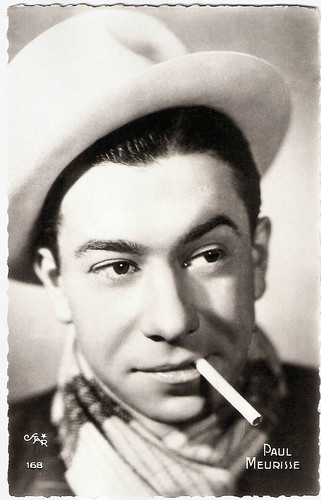
French postcard by Editions P.I., Paris, no. 168. Photo: Star.
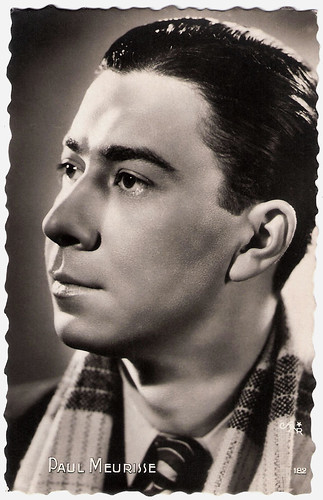
French postcard by Editions O.P., Paris, no. 192. Photo: Star.
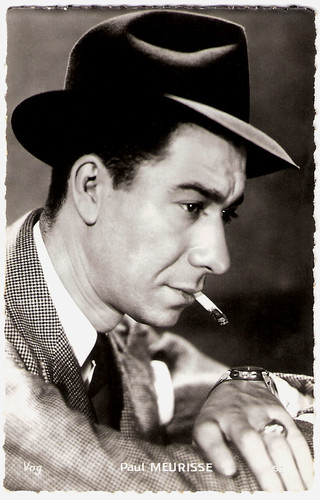
French postcard by Editions Chantal, Rueil, no. 58. Photo: Vog.
Intense portrayal of a psychopathic hoodlum
Paul Gustave Pierre Meurisse was born in Dunkirk, on the north-east coast of France, in 1912. He grew up on the island of Corsica, to which his bank manager father had been transferred when Meurisse was a small child. After leaving school, he moved to Aix-en-Provence, where he became a solicitor's clerk. His passion was for the stage, and he obtained evening work in the chorus of music hall revues.
In 1936, he left Aix for Paris, with a letter of recommendation signed by Huguette Duflos. Meurisse found work immediately, first at the Trianon and then at the ABC music hall in a show featuring the realistic singer Marie Dubas. He also appeared in Pigalle nightclubs. He specialised in taking cheerful, upbeat songs and singing them in a comically downbeat, lugubrious fashion.
In 1939, Meurisse met Edith Piaf, and the two became lovers for several months. Piaf, however, did not see a future for Meurisse as a singer and encouraged him to try his hand at acting instead. They appeared together in the play 'Le Bel Indifférent' (1939), written for them by Jean Cocteau. Meurisse's first screen role came in Vingt-quatre heures de perm’ / Twenty-four Hours Permit (Maurice Cloche, 1945), filmed in 1940 but not released until 1945. The comedy Ne bougez plus / Do Not Move (Pierre Caron, 1941) was the first of his films to be released. With Piaf, he co-starred in the dramatic comedy Montmartre-sur-Seine (Georges Lacombe, 1941). Like most of Piaf's impulsive romances, Meurisse was soon discarded, but he managed to do quite well for himself.
His breakthrough was as a gangster opposite Françoise Rosay in Macadam / Back Streets of Paris (Marcel Blistène, 1946). James Travers reviews at Films de France: “Meurisse's intense portrayal of a psychopathic hoodlum is arguably the best thing about this film, particularly as it captures something of the sadism and uncontrolled inner rage that Edward G. Robinson brought to his early gangster portrayals. Here Meurisse is partnered with Simone Signoret, a stunning newcomer who had yet to make her film breakthrough but who steals every scene she appears in with her barely contained sensuality and charisma, the archetypal femme fatale.”
Thereafter, his acting services were always in demand: in 1948, for example, he was credited in no fewer than seven films. Meurisse played a wide range of roles, from gangsters in films like Impasse des Deux-Anges / Impasse of Two Angels (Maurice Tourneur, 1948) to policemen in Inspecteur Sergil / Inspector Sergil (Jacques Daroy, 1947) and Le Dessous des cartes / Under the Cards (André Cayatte, 1948), from comedy in the Monocle films to historical in La contessa di Castiglione / The Contessa's Secret (Georges Combret, 1954) and L'Affaire des poisons / The Poison Affair (Henri Decoin, 1955). The quality of the films was variable, but Meurisse's versatility meant that his performance was often considered the best part of an otherwise mediocre effort.
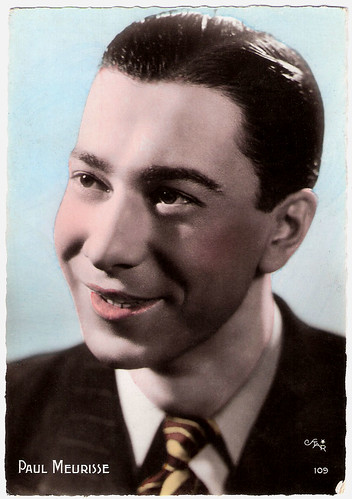
French postcard by Editions O.P., Paris, no. 109. Photo: Star.
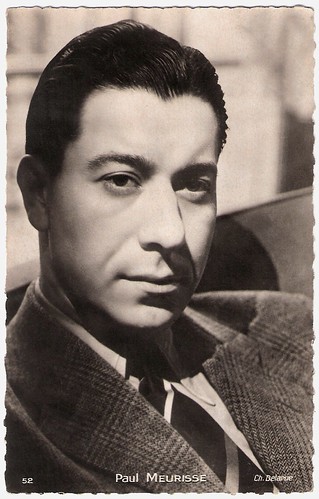
French postcard by Editions E.C., Paris, no. 52. Photo: Ch. Delarue.
Diabolique
Paul Meurisse's most famous role was that of Michel Delasalle in the psychological thriller Les Diaboliques / Diabolique (Henri-Georges Clouzot, 1955). Véra Clouzot and Simone Signoret play a woman and her husband's mistress who conspire to murder the man. After the crime is committed, however, his body disappears, and several strange occurrences ensue. In a thoroughly unsympathetic part, Meurisse was compelling as the husband and the film, with its dark, claustrophobic atmosphere and celebrated twist ending, became a success at the box office, with 3,674,380 admissions in France. It was also widely distributed in English-speaking markets and remains the film for which Meurisse is best known.
Other notable films in which Meurisse appeared include the mental hospital psychodrama La Tête contre les murs / Head Against the Wall (Georges Franju, 1959), the inquisitorial and oppressive Marie-Octobre / Secret Meeting (Julien Duvivier, 1959) starring Danielle Darrieux, Le Dejeuner sur l'herbe / Picnic on the Grass (Jean Renoir, 1959), and Clouzot's courtroom drama La Vérité / The Truth (Henri-Georges Clouzot, 1960) with Brigitte Bardot.
James Travers at French Films: “In most of his films, he had the air of a French aristocrat, impeccably dressed and carried along by an unflappable insouciance - this is exemplified by his best known role, Commandant Théobald Dromard, a.k.a. Le Monocle”. Meurisse played The Monocle in three Eurospy comedies: Le monocle noir / The Black Monocle (Georges Lautner, 1961), L'oeil du monocle / The Eye of the Monocle (Georges Lautner, 1962) and Le monocle rit jaune / The Monocle's Sour Laugh (Georges Lautner, 1964).
An important director in his later career was Jean-Pierre Melville, for whom he appeared opposite Lino Ventura in the crime thriller Le deuxième soufflé / Second Breath (Jean-Pierre Melville, 1966) and in the resistance drama L'Armée des ombres / Army of Shadows (Jean-Pierre Melville, 1969), again to critical acclaim. Bruce Eder at AllMovie: “It's all a far cry from the heroics and bold statements of patriotism that one usually expects in movies on this subject, but the resulting tension results in an engrossing, often spellbinding cinematic experience across 140 minutes of screen time - this reviewer (who never has the time for such indulgences) went back to see it three more times.” In this period, Meurisse also played twice opposite Alain Delon: in the comedy Doucement les basses / Easy Down There! (Jacques Deray, 1971) and in the drama Le Gitan / The Gypsy (José Giovanni, 1975).
Additionally, Meurisse appeared in many stage productions, from Marcel Achard and Jean Anouilh to William Shakespeare and George Bernard Shaw. In the mid-1950s, he was a sociétaire of the Comédie-Française. Meurisse married three times, to actress Michèle Alfa (1942, divorced), Micheline Cheirel (1951, divorced) and Micheline Gary (1960 to his death). Paul Meurisse was taken ill following a performance of 'Mon père avait raison', a play by Sacha Guitry at the Théâtre Hébertot in Paris, and he died in 1979 in Neuilly-sur-Seine of an asthma-related heart attack. He was 66.
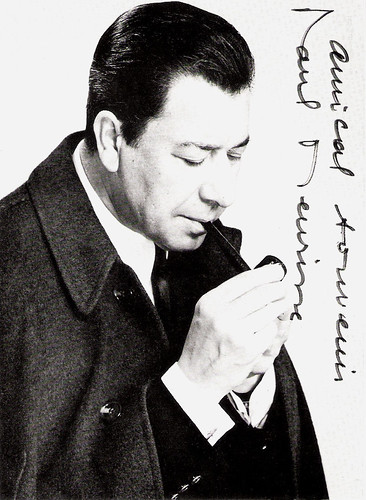
French postcard by La Roue Tourne, Paris.

Dutch film poster by Ad Werner voor Les diaboliques (Henri-Georges Clouzot, 1955).
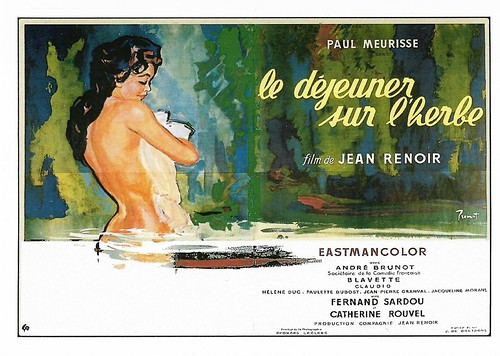
French postcard by Encyclopédie du cinéma, ADAGP, Paris. Poster or lobbycard of Le déjeuner sur l'herbe / Picnic on the Grass (Jean Renoir, 1959), starring Paul Meurisse. Poster design by Pierre-Laurent Brenot.
Sources: James Travers (French Films), Guy Bellinger (IMDb), Bruce Eder (AllMovie - Page now defunct), Hal Erickson (AllMovie - Page now defunct), Wikipedia (English and Dutch), and IMDb.
This post was last updated on 31 August 2025.
No comments:
Post a Comment